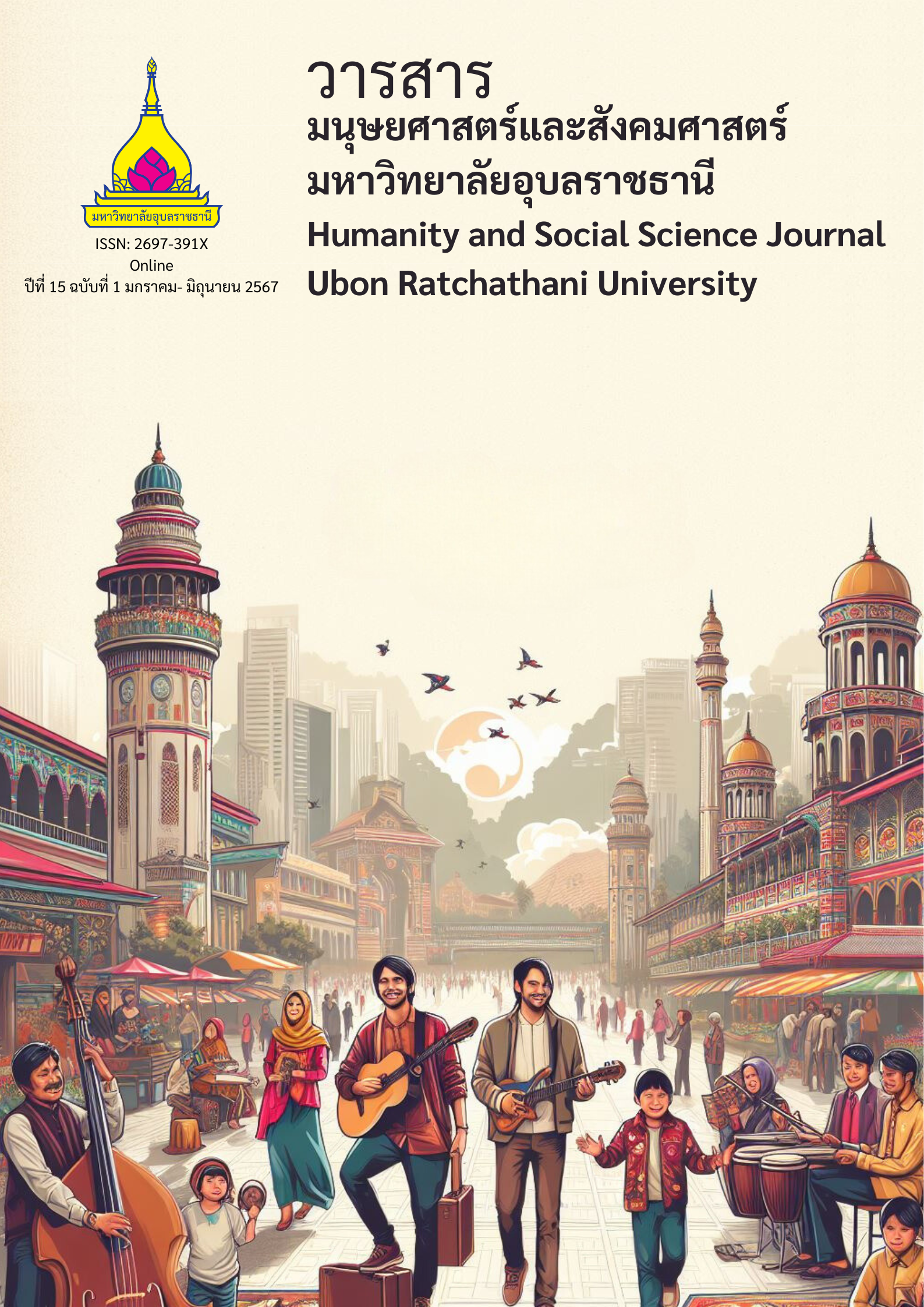การต่อยอดชุมชนมุ่งสู่วิสาหกิจเพื่อสังคม ด้วยกระบวนการคิดเชิงออกแบบ กรณีศึกษาจังหวัดอุบลราชธานี
Main Article Content
บทคัดย่อ
ข้อจำกัดที่ทำให้การทำกิจกรรมเพื่อสาธารณประโยชน์ของชุมชน
ขาดความต่อเนื่อง คือการสนับสนุนงบประมาณจากภาครัฐมีจำกัด แรงงาน
การผลิตส่วนใหญ่เป็นผู้สูงอายุ และไม่ได้รับความสนใจจากแรงงานหนุ่มสาวในชุมชน การศึกษาครั้งนี้จึงชวนชุมชนที่มีศักยภาพ 4 กลุ่มในจังหวัดอุบลราชธานี
มาเข้าร่วมกระบวนการคิดเชิงออกแบบ (design thinking) โดยมีผู้เชี่ยวชาญภาคเอกชนให้คำปรึกษาเพื่อทำความเข้าใจตนเอง ประเมินความเป็นไปได้ และร่วมออกแบบแผนธุรกิจตามแนวทางวิสาหกิจเพื่อสังคมที่มีเป้าหมายเพื่อสร้างรายได้ควบคู่ไปกับการทำคุณประโยชน์ให้แก่สังคม อันส่งผลให้เกิดความต่อเนื่องและยั่งยืนโดยไม่ต้องรองบประมาณจากรัฐ
ผลการศึกษาพบว่า ปัจจัยสำคัญของการพัฒนาเป็นวิสาหกิจเพื่อสังคมคือระบบการจัดการ การผลิต และโอกาสทางเศรษฐกิจ ซึ่งปัจจัยเหล่านี้สมาชิกชุมชนที่ส่วนใหญ่เป็นผู้สูงอายุมีข้อจำกัดไม่สามารถพัฒนาศักยภาพดังกล่าว
ด้วยตนเองได้ จึงต้องอาศัยกลไกภายในพื้นที่ทั้งองค์กรปกครองส่วนท้องถิ่น
ส่วนราชการ และภาคเอกชนในพื้นที่ ตลอดจนวัยหนุ่มสาวให้การหนุนเสริม อย่างไรก็ตาม วิสาหกิจเพื่อสังคมอาจเป็นคำตอบของชุมชนที่มีความพร้อม
ทางเศรษฐกิจเป็นทุนเดิม แต่ไม่ใช่คำตอบของชุมชนที่มุ่งรวมกลุ่มเพื่อสร้าง
ความสามัคคีภายในชุมชน
Article Details

อนุญาตภายใต้เงื่อนไข Creative Commons Attribution-NonCommercial-NoDerivatives 4.0 International License.
บทความที่ได้รับการตีพิมพ์เป็นลิขสิทธิ์ของวารสารมนุษยศาสตร์และสังคมศาสตร์ มหาวิทยาลัยอุบลราชธานี
ข้อความที่ปรากฏในบทความแต่ละเรื่องในวารสารวิชาการเล่มนี้เป็นความคิดเห็นส่วนตัวของผู้เขียนแต่ละท่านไม่เกี่ยวข้องกับมหาวิทยาลัยอุบลราชธานี และคณาจารย์ท่านอื่นๆในมหาวิทยาลัยฯ แต่อย่างใด ความรับผิดชอบองค์ประกอบทั้งหมดของบทความแต่ละเรื่องเป็นของผู้เขียนแต่ละท่าน หากมีความผิดพลาดใดๆ ผู้เขียนแต่ละท่านจะรับผิดชอบบทความของตนเองแต่ผู้เดียว
เอกสารอ้างอิง
Charussuksawad, V. (n.d.). Promoting Social Enterprises in Thailand. Office of the Council of State, Retrieved January 1, 2023, from http://web.krisdika.go.th/pdfPage.jsp?type=act&actCode=13429 (in Thai)
Diochon, M. & Anderson, A. (2009). Social Enterprise and Effectiveness: A process typology. Social Enterprise Journal, 5 (1), 7-29.
Els, R., Meyer, H. & Ellis, S. (2021). A Measurement Scale Developed to Investigate the Effect of Leaders' Perceptions Regarding Attitudes Towards and commitment to quality management of training. International Journal of Training and Development, 26 (1), 120-144.
Kim, A. (2007). Social Enterprise Typology. Virtue Ventures LLC.
Lester, D. L., Parnell, J. A., & Carraher, S. M. (2003). Organizational Life Cycle: A five-stage empirical scale. International Journal of Organizational Analysis, 11 (4), 339-354.
Moon, M. J. (2018). Evolution of Co-production in the Information Age: Crowdsourcing as a model of web-based co-production in Korea, Policy and Society, 37 (3), 294–309, DOI: 10.1080/14494035.2017.1376475.
Pangprasert, B., Naipinit, A. & Permwanichagun, P. (2020). The Corporate Sustainability Performance of Entrepreneurs (CSPE) on Social Enterprise in Thailand: A mixed methods approach, BU Academic Review, 19 (2), 73–87. (in Thai)
Parinyasutinun, U. (2017). Social Enterprise: Applying of community enterprise and community welfare for managing Thung Tamsao community. Journal of Community Development and Life Quality, 5 (2), 353–386. (in Thai)
Poocharoen, O. & Ting, B. (2015). Collaboration, Co-Production, Networks: Convergence of theories, Public Management Review, 17 (4), 587-614, DOI: 10.1080/14719037.2013.866479.
Prajaksilpthai, D. (2014). Is the Idea of a Social Enterprise Practical?, Thai Parliament, Retrieved September 28, 2022, from [https://www.parliament.go.th/ewtadmin/ewt/parliament_parcy/ewt_dl_link.php?nid=28205]. (in Thai)
Pratumsuwan, K. & Phansiri, P. (2021). Social Enterprise Based on Cultural Capital for Sustainable Development. University of the Thai Chamber of Commerce Journal Humanities and Social Sciences, 41 (3), 88-101. (in Thai)
Saaty, T. (2004). Fundamentals of the Analytic Network Process-dependence and Feedback in Decision-making with a Single Network. Journal of Systems Science and Systems Engineering, 13 (2), 129-157.
Santhitiwanich, A. & Wasinpiyamongkhon, N. (2021). Public Service Co-Providing of the Elderly in Ubon Ratchathani Province. Humanity and Social Science Journal, Ubon Ratchathani University, 12 (1), 25-44. (in Thai)
Sawasdee, W. & Masae, A. (2020). Potentiality Development of Tourism Social Enterprises in Thailand. Journal of Social Development, 22 (2), 1-22. (in Thai)
Siriphattrasophon, S. (2015). A Conceptual Study of Social Enterprise Development in Thailand. Journal of the Association of Researchers, 20 (2), 30-47. (in Thai)
Thansriskul, S. (2010). Factors Affecting Sustainable Community Development: A case study of local administration organization in Maha Sarakham province. Chophayom Journal, 21, 51–68. (in Thai)
Thongthanakul, S. (n.d.). Social Enterprise is booming: Opportunities for new generations. https://www.osep.or.th/ (in Thai)
Tiyatrakarnchai, C., Kunides, N. & Supat-Anyaporn, N. (2021). The Success of Social Enterprises in Driving the Thai Economy. Journalof MCU Peace Studies, 9 (3), 1179 – 1191. (in Thai)


